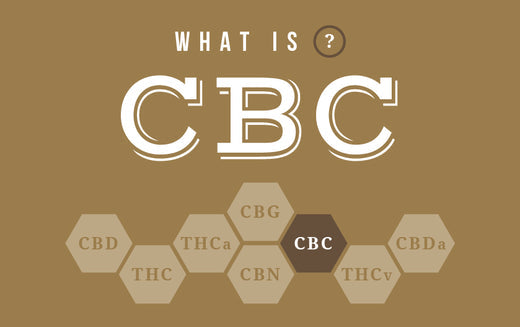For many years, CBD was the only known non-intoxicating cannabinoid and its research was hamstrung by the stringent laws governing the use of cannabis at the time. Following the discovery of CBD, other cannabinoid compounds came into the picture. One of the most prevalent being CBC, which was unearthed approximately fifty years ago.
Since the early 2000s, when the therapeutic value of CBD became widely recognized, hemp processors have been increasing production of rarer cannabinoids like CBC, CBG, and CBN. Many would-be users of these compounds don't know the pros and cons of one over another - or combinations. Therefore, a detailed comparison of CBC vs. CBD goes a long way to helping you make a decision that suits you best.
CBC vs CBD: Key Differences Between CBC and CBD
The key difference between CBC and CBD is their interaction with TRV1 receptors. CBC binds directly to the TRPV1 in the nervous system, making it more useful for inflammatory diseases. On the other hand, CBD links more with the 5-HT1A receptors, which is why it's so widely used to alleviate neuropathic pain.
WHAT IS CBD?
CBD, also known as cannabidiol, is a non-intoxicating chemical compound found in the cannabis sativa plant and widely recognized for its health benefits. From as early as the 2000s, various states in the US began to legalize the medical use of CBD in the medical field. Get more information on CBD in our Resource Library.
WHAT IS CBC?
CBC closely resembles CBD in that it's a non-intoxicating product that doesn’t compromise your senses or make you feel high. Instead, it may play an impactful role in the sustenance of your neurological health. It’s important to understand that there are limited cannabis sativa phenotypes that contain high levels of CBC. The compound isn’t extracted from the cannabis flower, but rather, it is derived directly from the stem cell, which is the point of inception for several cannabinoids.
By now you’re probably familiar with cannabinoids, especially the most common ones, THC and CBD. But you likely haven’t heard of cannabichromene, also known as CBC. Discovered over 50 years ago, CBC is considered one of the “big six” cannabinoids prominent in medical research. It doesn’t get as much attention, but CBC’s potential benefits are extremely promising.
CBC was first analyzed for the treatment or suppression of cancer, and the results indicate a direct correlation between CBC use and tumor size reduction. CBC may also promote neurological health, specifically the development of neural stem progenitor cells, potentially reducing the effects of Alzheimer’s in some people.
In 2013, Noriko Shinjyo, Ph.D., a Research Associate at Chiba University in Japan, coauthored a study with Italian scientist Vincenzo Di Marzo on cannabichromene (CBC), a phytocannabinoid that exerts profound effects on the nervous system.
In the study, published in Neurochemistry International, researchers conducted an investigation into the impact of CBC on adult neural stem progenitor cells. These cells play a crucial role in brain function, both in healthy individuals and those with pathological conditions. As stem cells progress through their maturation process, they undergo changes and develop into different types of cells, including neurons. The study found that CBC had a positive influence on the neural stem progenitor cells during this maturation phase, as demonstrated through in vitro experiments.
The findings of this research highlight the potential benefits of CBC in promoting the development and functionality of neural stem progenitor cells. By positively influencing these cells during their maturation process, CBC may contribute to enhanced brain function and potentially offer therapeutic opportunities for various neurological conditions. This is particularly significant considering the essential role that neural stem progenitor cells play in maintaining brain health and repairing damaged tissue.
Although further research is needed to fully understand the mechanisms underlying CBC's effects on neural stem progenitor cells, these findings provide valuable insights into the potential therapeutic applications of this compound. Additionally, this study contributes to our understanding of the complex processes involved in brain development and highlights the importance of exploring the potential benefits of cannabinoids in neurobiology.
Compared to CBD, CBC has a direct link on the TRPV1 receptors in the nervous system, making it a valuable analgesic tool. Consequently, inflammatory conditions and pain related to arthritis or any illness of similar nature may be controlled using CBC.
As more hemp processors begin to produce CBC isolates and distillates, Kine is looking forward to adding this to our product offering.
How CBC and CBD May Make You Feel
So, what’s the difference between CBC vs CBD? While both types are non-intoxicating cannabinoids, meaning they won't make you feel "high," their effects are typically subtle, but there are differences between the two, such as:
CBC (Cannabichromene):
- May offer mild relief from inflammation.
- May promote a sense of mild relaxation.
CBD (Cannabidiol):
- May help reduce anxiety and stress without causing drowsiness.
- May alleviate pain and discomfort, improving overall well-being.
- May assist in regulating sleep patterns for a more restful night's sleep.
Individual responses vary, so start with lower doses, monitor your body's reaction, and adjust as needed. You should also talk to your doctor, healthcare provider, or cannabinoid specialist, who can provide personalized guidance based on your health goals.
Pros and Cons of CBC vs CBD
Both cannabinoids are non-intoxicating - each with distinctive properties and potential benefits. Here, we'll explore the pros and cons of each to help you better understand which may be more suitable for your specific needs:
Pros of CBC:
Potential Anti-Inflammatory Properties: CBC has been found to bind directly to TRPV1 receptors in the nervous system, making it a promising tool for managing inflammatory conditions. This could offer relief to individuals dealing with issues like arthritis or other inflammatory illnesses.
Neurological Health: Research suggests that CBC may promote neurological health by influencing the development of neural stem progenitor cells. This could have implications for conditions like Alzheimer's disease and other neurological disorders.
Analgesic Effects: CBC's direct interaction with TRPV1 receptors also makes it a valuable analgesic (pain-relieving) agent. It may help alleviate pain associated with various health issues.
Cons of CBC:
Limited Availability: CBC is not as readily available as CBD because it's found in limited cannabis sativa phenotypes. Additionally, it's derived from the stem cells rather than the flower, which makes it less accessible in some cases.
Limited Research: While promising, research on CBC is still in its early stages, and there is much more to learn about its potential benefits and any potential side effects.
Pros of CBD:
Well-Established Benefits: CBD has gained widespread recognition for its potential health benefits, including anxiety and stress reduction, pain management, and anti-seizure properties.
Legal Status: CBD is legal in many regions and countries, making it more accessible for consumers.
Versatility: CBD can be found in a variety of products, including oils, edibles, topicals, and more, allowing users to choose the most suitable consumption method.
Cons of CBD:
Variability: The quality and effectiveness of CBD products can vary widely, so it's essential to do thorough research when selecting a product. All of Kine’s products are rigorously tested and the results are publicly available here.
Potential Side Effects: While generally well-tolerated, some users may experience side effects such as dizziness, dry mouth, or changes in appetite.
Drug Interactions: CBD can interact with certain medications, so it's crucial to consult with a healthcare professional before using it, especially if you are taking other medications.
Can You Take CBD and CBC Together?
Many individuals wonder whether it's possible to combine CBD and CBC for enhanced effects. While both cannabinoids offer unique potential benefits, there is limited research on their combined use. However, some users have reported positive outcomes when using these cannabinoids together. Combining them may offer a broader spectrum of potential benefits, including anti-inflammatory and analgesic effects.
If you're considering using CBD and CBC in combination, it's essential to start with small doses of each and monitor your body's response. Additionally, consulting with a healthcare provider or a specialist in cannabinoid therapy is advisable to ensure safe and effective usage, especially if you are taking other medications or have underlying health conditions. As research in this area continues, we'll better understand the potential synergistic effects of combining these cannabinoids.
When to Take CBD and CBC
The timing of when to take CBD and CBC largely depends on your specific wellness goals. For general well-being and daily support, many users prefer to incorporate these cannabinoids into their daily routine in the morning or evening. However, the timing can be adjusted based on your individual needs. If you're still unclear about taking CBD vs CBC for specific purposes such as pain management or sleep support, you should talk about your concerns with a healthcare provider. Remember that individual responses to these cannabinoids can vary, so it's important to listen to your body and make adjustments as needed to achieve the desired effects.
CBC vs CBD: Which Is Better, CBC or CBD?
The choice between CBC vs CBD ultimately depends on your individual health goals and needs. There is no one-size-fits-all answer to this question. CBC shows promise in targeting inflammatory conditions and neurological health, while CBD is well-established for its versatility and potential benefits in managing anxiety, pain, and more.
To make an informed decision about the difference between CBD and CBC, it's essential to consult with a healthcare provider or a specialist in cannabinoid therapy. They can assess your specific circumstances, medical history, and desired outcomes to guide you toward the cannabinoid that best suits your requirements.
We hope we’ve fully answered your question, “What is CBC vs CBD?” in this guide. Just remember that the effectiveness of these compounds may vary from person to person, and what works best for one individual may not be the same for another. It's about finding the right fit for your unique wellness journey.

